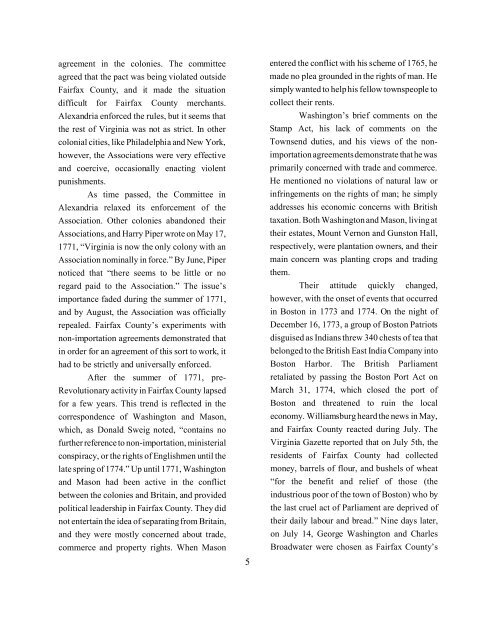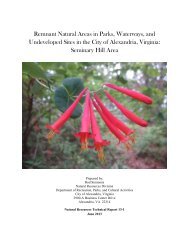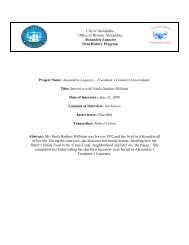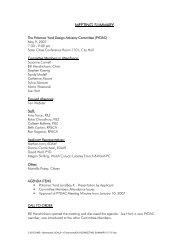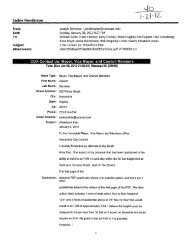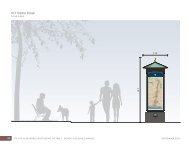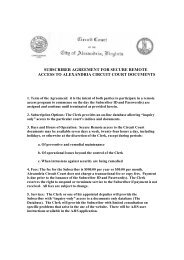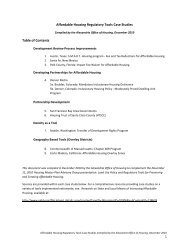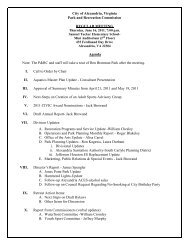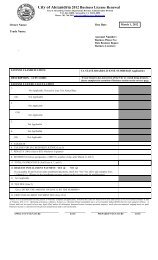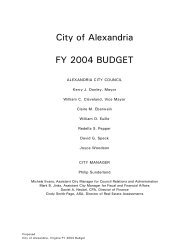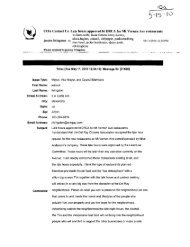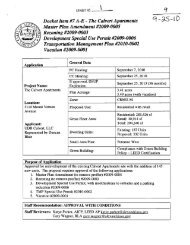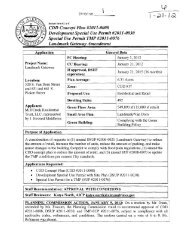LOYALISM IN EIGHTEENTH CENTURY ... - City of Alexandria
LOYALISM IN EIGHTEENTH CENTURY ... - City of Alexandria
LOYALISM IN EIGHTEENTH CENTURY ... - City of Alexandria
You also want an ePaper? Increase the reach of your titles
YUMPU automatically turns print PDFs into web optimized ePapers that Google loves.
agreement in the colonies. The committee<br />
agreed that the pact was being violated outside<br />
Fairfax County, and it made the situation<br />
difficult for Fairfax County merchants.<br />
<strong>Alexandria</strong> enforced the rules, but it seems that<br />
the rest <strong>of</strong> Virginia was not as strict. In other<br />
colonial cities, like Philadelphia and New York,<br />
however, the Associations were very effective<br />
and coercive, occasionally enacting violent<br />
punishments.<br />
As time passed, the Committee in<br />
<strong>Alexandria</strong> relaxed its enforcement <strong>of</strong> the<br />
Association. Other colonies abandoned their<br />
Associations, and Harry Piper wrote on May 17,<br />
1771, “Virginia is now the only colony with an<br />
Association nominally in force.” By June, Piper<br />
noticed that “there seems to be little or no<br />
regard paid to the Association.” The issue’s<br />
importance faded during the summer <strong>of</strong> 1771,<br />
and by August, the Association was <strong>of</strong>ficially<br />
repealed. Fairfax County’s experiments with<br />
non-importation agreements demonstrated that<br />
in order for an agreement <strong>of</strong> this sort to work, it<br />
had to be strictly and universally enforced.<br />
After the summer <strong>of</strong> 1771, pre-<br />
Revolutionary activity in Fairfax County lapsed<br />
for a few years. This trend is reflected in the<br />
correspondence <strong>of</strong> Washington and Mason,<br />
which, as Donald Sweig noted, “contains no<br />
further reference to non-importation, ministerial<br />
conspiracy, or the rights <strong>of</strong> Englishmen until the<br />
late spring <strong>of</strong> 1774.” Up until 1771, Washington<br />
and Mason had been active in the conflict<br />
between the colonies and Britain, and provided<br />
political leadership in Fairfax County. They did<br />
not entertain the idea <strong>of</strong> separating from Britain,<br />
and they were mostly concerned about trade,<br />
commerce and property rights. When Mason<br />
5<br />
entered the conflict with his scheme <strong>of</strong> 1765, he<br />
made no plea grounded in the rights <strong>of</strong> man. He<br />
simply wanted to help his fellow townspeople to<br />
collect their rents.<br />
Washington’s brief comments on the<br />
Stamp Act, his lack <strong>of</strong> comments on the<br />
Townsend duties, and his views <strong>of</strong> the non-<br />
importation agreements demonstrate that he was<br />
primarily concerned with trade and commerce.<br />
He mentioned no violations <strong>of</strong> natural law or<br />
infringements on the rights <strong>of</strong> man; he simply<br />
addresses his economic concerns with British<br />
taxation. Both Washington and Mason, living at<br />
their estates, Mount Vernon and Gunston Hall,<br />
respectively, were plantation owners, and their<br />
main concern was planting crops and trading<br />
them.<br />
Their attitude quickly changed,<br />
however, with the onset <strong>of</strong> events that occurred<br />
in Boston in 1773 and 1774. On the night <strong>of</strong><br />
December 16, 1773, a group <strong>of</strong> Boston Patriots<br />
disguised as Indians threw 340 chests <strong>of</strong> tea that<br />
belonged to the British East India Company into<br />
Boston Harbor. The British Parliament<br />
retaliated by passing the Boston Port Act on<br />
March 31, 1774, which closed the port <strong>of</strong><br />
Boston and threatened to ruin the local<br />
economy. Williamsburg heard the news in May,<br />
and Fairfax County reacted during July. The<br />
Virginia Gazette reported that on July 5th, the<br />
residents <strong>of</strong> Fairfax County had collected<br />
money, barrels <strong>of</strong> flour, and bushels <strong>of</strong> wheat<br />
“for the benefit and relief <strong>of</strong> those (the<br />
industrious poor <strong>of</strong> the town <strong>of</strong> Boston) who by<br />
the last cruel act <strong>of</strong> Parliament are deprived <strong>of</strong><br />
their daily labour and bread.” Nine days later,<br />
on July 14, George Washington and Charles<br />
Broadwater were chosen as Fairfax County’s


